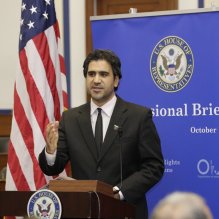International Dignitaries Rally for a New Iran Policy, Support NCRI as Democratic Alternative


By Dr. Majid Rafizadeh
When it comes to Iran, discerning observers are usually fixated on the contentious nuclear issue, as well as Tehran’s unabated sponsorship of terrorism. However, recently, a conspicuous spotlight was cast on the intricate internal dynamics, capturing the attention of the global community. Following engagements with the regime, both European and American governments made a consequential decision to assuage the regime’s sensibilities by ascending to one of its paramount demands: imposing constraints on the activities of the principal opposition. The prompt failure of these efforts has shed light on fundamental realities, deserving of profound contemplation by Western policymakers.
Amidst a recent flurry of reports surrounding negotiations between Washington and Tehran, a disconcerting pattern of concessions has emerged, all of which pertain to the National Council of Resistance of Iran (NCRI) and its main constituent, the Mujahedin-e Khalq (MEK). In May, Belgium facilitated the repatriation of a convicted terrorist to Iran. Assadollah Assadi, an accredited diplomat, had been found guilty by European courts for orchestrating the foiled bombing plot targeting an NCRI rally in Paris in 2018.
In June, the Iranian regime’s president Ebrahim Raisi held a 90-minute phone conversation with his French counterpart Emmanuel Macron. State-controlled media swiftly reported that Raisi had demanded curbs on the activities of the NCRI. France then announced an unforeseen ban on an NCRI rally slated to take place on July 1.
A few hours after that decision, the Albanian government, reportedly after engaging Tehran intelligence services, raided the MEK’s main headquarters near Tirana, leading to one death and over 100 injuries. The US State Department tacitly approved of the raid.
These developments encapsulate a compendium of Western concessions and diplomatic overtures to a dangerous regime. The absence of happenstance here is clear, as the measures conspicuously align with a discernible pattern of appeasement. The flawed assumption is that such actions can convince the ruling mullahs to curtail their nefarious pursuits, including terrorism or the relentless march toward a nuclear bomb. Astonishingly, however, all these actions ultimately failed to achieve the intended results.
Amidst a recent flurry of reports surrounding negotiations between Washington and Tehran, a disconcerting pattern of concessions has emerged, all of which pertain to the National Council of Resistance of Iran (NCRI) and its main constituent, the Mujahedin-e Khalq (MEK). In May, Belgium facilitated the repatriation of a convicted terrorist to Iran. Assadollah Assadi, an accredited diplomat, had been found guilty by European courts for orchestrating the foiled bombing plot targeting an NCRI rally in Paris in 2018.
In June, the Iranian regime’s president Ebrahim Raisi held a 90-minute phone conversation with his French counterpart Emmanuel Macron. State-controlled media swiftly reported that Raisi had demanded curbs on the activities of the NCRI. France then announced an unforeseen ban on an NCRI rally slated to take place on July 1.
A few hours after that decision, the Albanian government, reportedly after engaging Tehran intelligence services, raided the MEK’s main headquarters near Tirana, leading to one death and over 100 injuries. The US State Department tacitly approved of the raid.
These developments encapsulate a compendium of Western concessions and diplomatic overtures to a dangerous regime. The absence of happenstance here is clear, as the measures conspicuously align with a discernible pattern of appeasement. The flawed assumption is that such actions can convince the ruling mullahs to curtail their nefarious pursuits, including terrorism or the relentless march toward a nuclear bomb. Astonishingly, however, all these actions ultimately failed to achieve the intended results.
The fact that the rally not only transpired against all odds and obstacles, but also attracted a formidable assembly of high-ranking officials and legislators, signifies an astonishing display of prowess by the organized opposition. The event stands as a stark reminder of the shifting dynamics within Iran, particularly in the face of appeasement efforts by the US, the United Kingdom, and the European Union, with France assuming a leading role. It unfolds at a critical juncture, with the regime grappling with a prolonged uprising. The opposition’s strength, resilience, and vitality should prompt a reevaluation of Western perspective on the future trajectory of Iran as well as the futility of appeasement.
The regime’s relentless entreaties to exert pressure on the resistance expose the depths of its fears and the lengths it is willing to go in its bid to eradicate the organized opposition. Tehran sees the NCRI as its only viable alternative and is increasingly terrified of the preeminent role played by the MEK in galvanizing the uprisings that aim to overthrow the theocracy. Such apprehension is a telling reflection of the regime’s recognition that the NCRI poses a real and imminent danger.
The resistance’s ability to forge ahead with its summit and rally amid relentless pressures represents a political and logistical feat bordering on the miraculous. It underscores the existence of a legitimate alternative with deep social roots and extensive global support. It ought to prompt profound reflection among policymakers.
Today, the regime finds itself in a state of international isolation and unprecedented domestic weakness, beset by a rising tide of popular discontent. In addition to portending a shifting landscape of significant proportions, these dynamics demand the rejection of appeasement and a more decisive and firm policy against the brittle theocratic regime.
Majid Rafizadeh

Dr. Majid Rafizadeh is a Harvard-educated Iranian-American political scientist. He is a leading expert on Iran and US foreign policy, a businessman, and president of the International American Council. He serves on the boards of the Harvard International Review, the Harvard International Relations Council, and the US-Middle East Chamber for Commerce and Business. Twitter: @Dr_Rafizadeh
This article was originally published on townhall
Join us on YouTube:
Iran Panorama
Comments
Post a Comment